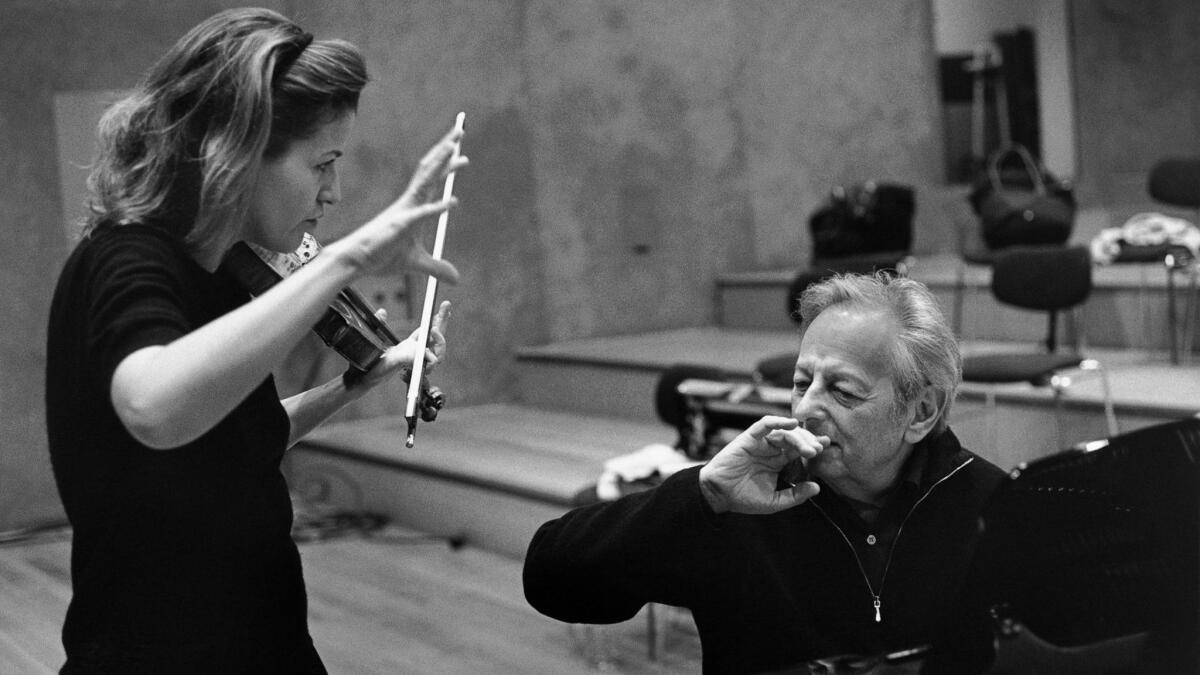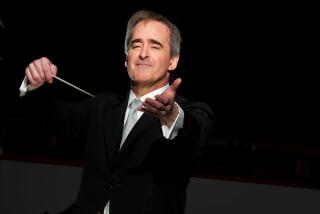Appreciation: André Previn: A hit in Hollywood, lionized in London, but it all began in Berlin
Reporting from Berlin — It felt strangely appropriate that the news of André Previn’s death reached me here, in the German capital, where he was born in 1929 and spent his first nine years, one-tenth of his life. Had his family not fled the Nazis and emigrated to Los Angeles and changed his name, he would have remained Andreas Ludwig Priwin and almost certainly become a celebrated classical German pianist revered for his Mozart and Brahms.
In fact, as André Previn, he did become a celebrated pianist capable of bringing lyrical enchantment to Mozart and Brahms, but he is far better remembered in the obituaries for the obligatory statistic that as a young jazz pianist in 1956, he and drummer Shelly Manne were the first to make a jazz record that sold a million copies with their interpretations of songs from “My Fair Lady.” Previn’s Berlin beginnings, on the other hand, has been an inconvenient fact skipped over in one of the most remarkable careers in music.
The Previn we know was the incomparable musical polymath. He was a famed film composer and arranger who worked on more than 50 movies and won four Oscars. He had hit songs to his credit. Believe it or not, he was an even more exceptional chamber musician than jazz improviser.
He became music director or principal guest conductor of seven major symphony orchestras (including the Los Angeles Philharmonic) on three continents. His extensive collection of classical works to which he devoted the last decades of his long life include two operas, numerous concertos, stunning song cycles and reams of gratifying chamber music. His recordings in several genres number in the hundreds, and more are keepers than are not.
We may also remember the Hollywood celebrity Previn, a regular in the gossip columns. The third of his five wives was Mia Farrow, whom he married just after she broke up with Frank Sinatra.
As music director of the London Symphony Orchestra in the 1970s, Previn became lionized for his swinging hipness, single-handedly revolutionizing the stodgy London classical music scene. His weekly hit BBC TV show, “André Previn’s Music Night” — for which he dressed his otherwise formal LSO in sweaters and entertained with witty, breezy, illuminating and ultimately classy commentary — made him among the most recognizable musicians in the home of the Beatles and the Rolling Stones.
Who cares about Berlin? Previn didn’t seem to. Even after he became a renowned conductor who worked and recorded regularly with the Vienna Philharmonic and married the Munich-born violinist Anne-Sophie Mutter late in his life, he never had much, if anything, to do with Berlin.
He was, after all, another Leonard Bernstein, an American original. Tribute after tribute credits him with blurring boundaries, including obituaries in the press here.
Original, yes, but Previn was, if anything, the un-Bernstein. He made it his unwavering practice to absolutely respect boundaries. Crossing over was just fine, as long as you remember that in France do as the French do.
He did that better than anyone else. But he did not care for musical intermarriage beyond dressing the LSO in yellow sweaters for TV. A movie score was one thing. A symphony something else altogether. Likewise, a jazz improvisation. Previn once told me that he sweated bullets the only time he ever improvised a cadenza in a Mozart piano concerto and swore he’d never tried that again.
Because of that attitude, Previn never fully fit in any of the areas in which he excelled, and for all his with-it-ness, he was never altogether the man of his time. He was too highbrow to be satisfied as a film composer. He admitted to taking the easy road sometimes when it came to improvisation, relying on technique and unfavorably comparing himself to Art Tatum.
His most important symphony posts, however successful, ultimately ended in grief when he came into conflict with management that wanted more glitz, even a bit of Hollywood.
His classical scores, urbane and often quite wonderful, steadfastly keeping to his core musical values, can seem out of step with the times and trends.
At least some of this comes from expectations ingrained in Previn during his early Berlin years. He grew up in privilege, his father a successful lawyer and excellent amateur pianist who recognized and fostered his son’s obvious gifts and took him to Berlin Philharmonic concerts conducted by the legendary Wilhelm Furtwängler, a conductor for whom every performance was meant to be a spiritual revelation.
In Berlin, in Paris (where the Previns spent a year awaiting papers to enter the U.S.) and then as soon as he reached L.A., the young André always had the finest teachers and important connections. Jascha Heifetz, with whom André suspected his mother of having an affair, sponsored the family’s immigration. André’s father’s cousin, Charles Previn, was an established film composer who opened doors to the studios for André while he was still a student at Beverly Hills High School.
Extraordinarily adaptable, he lost his German accent and became an American kid seemingly overnight. By 20, he was a full-fledged member of the MGM music department and scored his first full feature, a Lassie film. He was already making jazz records, writing songs and dating starlets.
But at the same time Previn sought out top figures in the émigré community with whom to study composition (Mario Castelnuovo-Tedesco) and to play chamber music (violinist Joseph Szigeti). He studied conducting with San Francisco Symphony music director Pierre Monteux, who had given the premiere of Stravinsky’s “The Rite of Spring.”
By 32, Previn had had enough of Hollywood and he gave it all up to become a conductor. He had meant it to be a clean break, but the Hollywood that had helped to mold him haunted him the rest of his life.
He was too Hollywood and too Berlin for the Houston Symphony, becoming its music director in 1967. Previn scandalized Houston society by having an affair with Mia Farrow while still married to Dory Previn, and he ran afoul of the symphony management, which he found to be provincial.
Then in London, Previn came into his own. He had all the sophistication he could want and an exceptional orchestra that appreciated his consummate musicianship. On Previn’s part he became a champion of British music and a friend of some of Britain’s top composers, such as William Walton and Benjamin Britten.
British music gave him a way to distinguish himself from Berlin and Hollywood without having to lower his standards. He became close friends with the likes of Tom Stoppard. He lived in Surrey like an English gentleman.
BERLIN: Yuval Sharon brings his L.A. brand of controversy to a new ‘Magic Flute’ »
But Previn also lived in a world of his own. By the end of the 1970s the LSO, which competed with four other major London orchestras, decided it need more commercial projects, such as doing classic rock, which Previn, not wanting to confuse popular music with symphonic mission, opposed. “I don’t go to parties I’m not invited to,” he said, and he resigned.
A position with the Pittsburgh Symphony ended again with management ill will. Then came his appointment in 1985 to the L.A. Phil run by Ernest Fleischmann. Previn and Fleischmann thought they understood each other; both were German Jews who had fled the Nazis with their families.
There were plenty of warnings otherwise. Fleischmann had been manager of the LSO until he was fired the year before Previn arrived for being too assertive. In L.A. he had become brilliantly commercial. He thought Previn perfect a perfect fit with his Hollywood background, his celebrity and his LSO credibility.
Previn, however, shunned Hollywood and the jazz world, feeling the need to prove himself in Mozart and Beethoven and Schoenberg. He programmed English music that didn’t sell. Always reserved, he had long avoided any kind of Bernstein showiness to the point, at times, of practically fading into the woodwork.
He gave some terrific concerts. I thank Previn for showing me the value of Vaughan Williams, for instance. He had a flair for the Russians — Rachmaninoff, Prokofiev and Shostakovich (whose orchestral writing had secretly informed Previn’s film scores, but he wasn’t yet about to let on to that). A disappointed Fleischmann wanted him out and employed shameful psychological warfare to make it happen.
From that point on Previn developed a chip on his shoulder about L.A. He moved to New York where he could be freer to maintain Berlin-level standards. His brief music directorships in London and Oslo were uneventful, never amounting much.
You can take the boy out of L.A., but … Previn begin playing jazz again, wonderfully, and conducting the occasional classic film score, incomparably. He did a considerable amount of guest conducting and recording, generally on a high, if unprepossessing, level.
More important, as Previn made musical peace with L.A. he became liberated as a composer. The facility he learned in Hollywood, combined with his own musical virtuosity and, in his vocal music, his intimacy with literary texts, led to a music that sounded effortless, immediate and important.

When he married Mutter, 34 years his junior, in 2002, Previn closed the circle. He had married a woman he firmly believed to be the greatest violinist. She was glamorous, German and a deep musician.
They divorced after only four years, but she remained his muse and stayed in daily contact up until the end.
Previn never set foot again in L.A., but he did accept a centennial commission from the L.A. Phil, scheduled to be conducted by Gustavo Dudamel for the opening concert of fall 2019. He was working on it at the time of his death, and it is not yet known what state he left it.
Whether or not Previn meant the commission as a reconciliation, he never lost a film composer’s ethos of writing music to fit a specific performer or occasion. He wrote, he said, not for the future but for now.
Ironically, I expect that knowing the full trajectory, we will listen to his music a little differently and that it will matter a little more. Possibly a lot more.
More to Read
The biggest entertainment stories
Get our big stories about Hollywood, film, television, music, arts, culture and more right in your inbox as soon as they publish.
You may occasionally receive promotional content from the Los Angeles Times.











